This Underrated European City Has One of the Largest Old Towns, a Futuristic Complex, and 12 Miles of Beaches
Valencia's historic center is one of Europe’s largest.
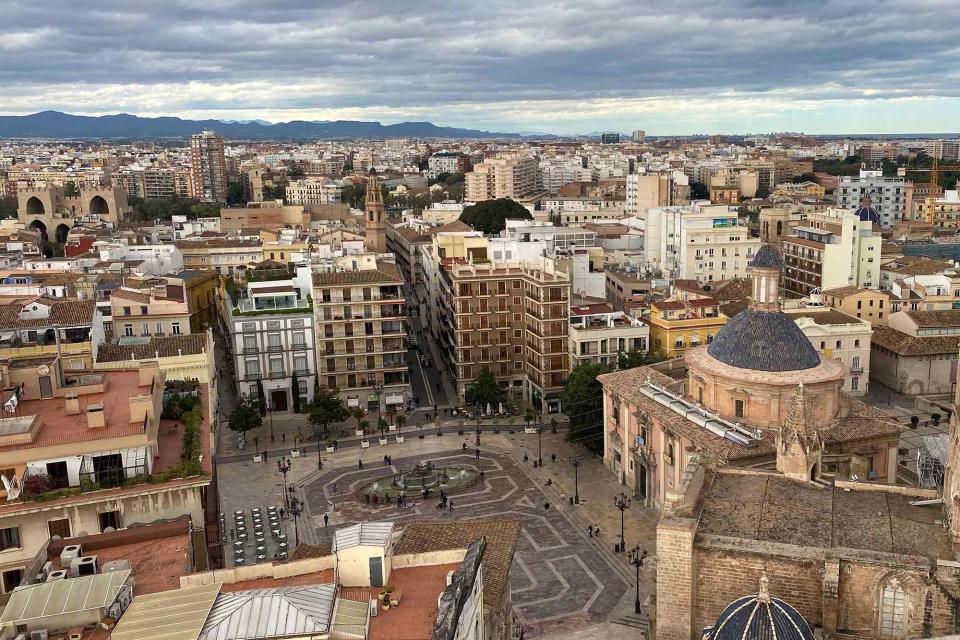
Rachel Chang/Travel + Leisure
Aerial view of Plaza de la Virgen and Valencia CathedralSauntering through the Gothic-style cathedral with an audio guide loosely held up to my ear, my thoughts began to wander. It was late afternoon in the third city of my European trip, and as awestruck as I was when I first stepped into the building, it was yet another church in yet another historic city center. At this point, I was rotely playing the role of traveler, letting my instincts guide the way. I snapped a couple of shots of an ornate chapel off to the side that caught my eye and turned toward the exit.
But then two words from the audio guide made me perk to attention. I hit rewind. It couldn’t be. But apparently, without even trying, I had stumbled upon what archaeologists believe to be the actual Holy Grail, a golden chalice used by Jesus during the Last Supper.
What sheer luck. Without an ounce of effort or even realizing I was in the city where it resided, I had accidentally stumbled upon the elusively legendary relic here in the Cathedral of València.
The truth is, València, Spain, itself just might be the holy grail of travel destinations. While so many destinations lure visitors with the promise of having something for everyone or a little taste of everything, Spain's third-biggest metropolis actually delivers multiple vacation types in one — and that accidental find was just the start of a string of constant joys I found myself in.
A Truly Historic City Center
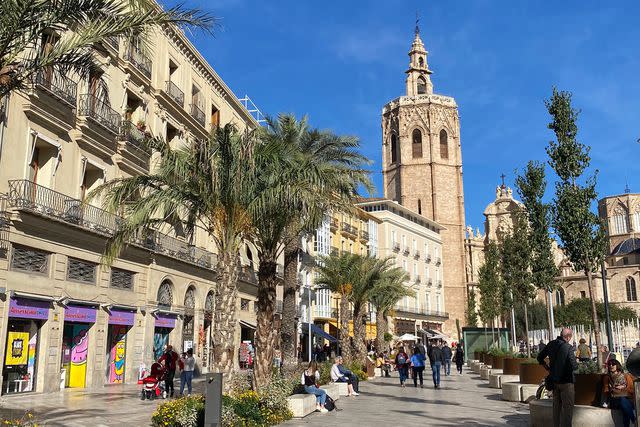
Rachel Chang/Travel + Leisure
El Miguelete is the bell tower of the Valencia Cathedral in Valencia, SpainHaving been the home to Romans, Visigoths, and Muslims, more than 2,000 years of history are tucked into València’s old town dating back to 130 B.C.E. But what makes it so enthralling is also its size: it is one of Europe’s largest historic centers.
Besides stumbling upon the Holy Grail at the cathedral, I also climbed its 207 steps up a spiral staircase up to the El Miguelete Gothic-style tower, built between 1381 and 1424. From under its still-operating bell, the panoramic view that emerges showcases just how massive the old town is, with its endless maze of winding roads below.
Back on the ground, I found myself making several visits to Mercat Central de València — Europe’s largest fresh produce market — eating my way through the central market, sampling everything from wine and cheese to Spain’s famed cold cuts. But the most delightful treat was also the most local — Valencian horchata, made here of tiger nuts, refreshing with a touch of sweetness.
While passing through the Plaza de la Virgen just after noon on a Thursday, I came across the Tribunal de las Aguas (Water Court), a tradition that has continued for more than 1,000 years. At the outdoor proceedings, democratically elected farmers go about their rulings on 17th-century chairs. When one official spotted me as a curious tourist, he guided me over to take a photo sitting in one of the historic chairs and also introduced me to the court’s bailiffs.
A Glimpse Into the Future
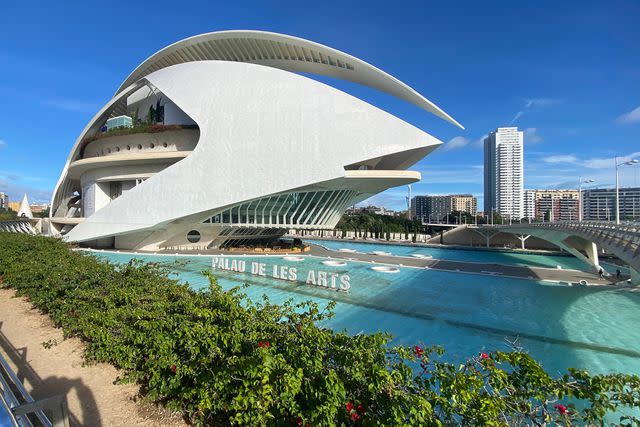
Rachel Chang/Travel + Leisure
Exterior of the Palau de les Arts Reina Sofia in Valencia, Spain designed by Santiago CalatravaJust a few kilometers to the southeast, time blasts into the future at the City of Arts and Sciences, a futuristic complex designed by Valèncian architect Santiago Calatrava and built along the River Turia’s old riverbed, breathing a new and innovative life into the center of València.
The Hemisfèric was the first to open back in 1998, a convex-shaped building representing an eye, that appropriately serves as a 3-D theater with a concave screen. Also part of the area is the continent’s biggest aquarium Oceanogràfic, the interactive Museum of Sciences, the performance venue Palau de les Arts Reina Sofia, the open-access garden L’Umbracle Terraza, and the CaixaForum Valencia, dedicated to exhibits that combine history, art, science and technology.
While exploring each of the sites is a different cultural experience, even just walking — and even better, biking — through the City of Arts and Sciences is like a trip into the future.
Mediterranean Beach Getaway
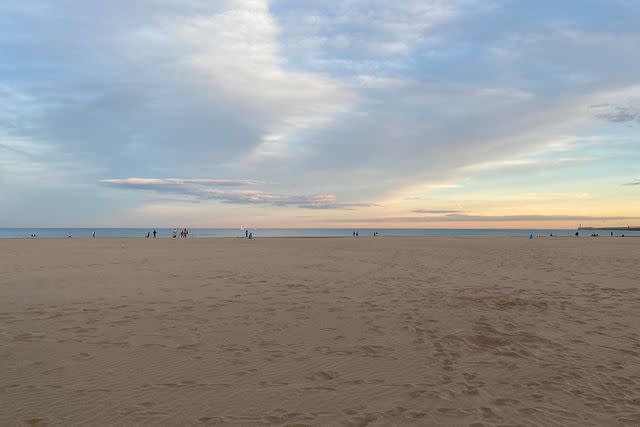
Rachel Chang/Travel + Leisure
Sunset over a sandy beach in Valencia, SpainWith urban discoveries thousands of years into the past and future, nothing seems further away than soaking in the sun on the sand. Yet in less than a 20-minute ride on the train (also possible by a 10-minute drive), I was whisked away into the most sprawling of Spain's Mediterranean beaches.
In fact, València has more than 12 miles of golden beaches, especially remarkable for how wide the stretch of sand runs in some patches, including at Cabanyal and Malvarrosa beaches. The promenade between the two is a refined boardwalk, with boutiques and gift shops mixed with charming cafes, all luring patrons with their local dishes.
But this is so much more than just a city beach. Water sports facilities are abundant here, with two of the largest being the beach volleyball complex and the Malvarrosa reef.
Nature, Brutalism, and Innovative Cultural Finds
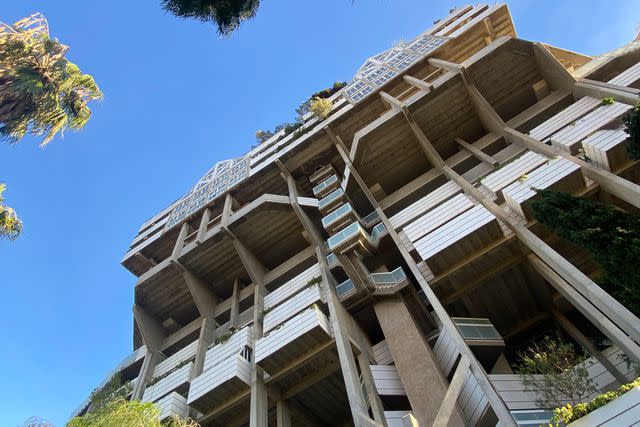
Rachel Chang/Travel + Leisure
Residencial "Espai Verd" is an apartment building designed by Antonio Cortés Ferrando in Valencia, SpainAdmittedly one of the first things I learned about València was that it was the home of the paella. What I didn’t expect was that its precise birthplace is Albufera Natural Park. Just about six miles south of the city, yet another persona of the city comes into view. A soothing slice of natural wonderland, rooted around a huge freshwater lagoon. With more than 300 species of birds, the Racó de l’Olla Interpretation Centre provides an overview, as well as observatories. For a quintessential Albufera experience, book a boat trip and paella outing.
Also adding dimension to València’s persona: Espai Verd, an M.C. Escher-like brutalist cooperative apartment complex built by Antonio Cortés Ferrando in the early 1990s, as well as Bomba Gens, a digital arts center in a former Art Deco factory, located in Marxalenes neighborhood, a burgeoning artsy part of town.
Underneath it all, there’s a savviness about the city, rooted in its dedication to sustainability and digitalization, which earned it the title of a European Capital of Smart Tourism two years ago. While Madrid and Barcelona may be the headline attractions for Spain, Valencia offers every kind of vacation, with far less of the crowds.
For more Travel & Leisure news, make sure to sign up for our newsletter!
Read the original article on Travel & Leisure.


